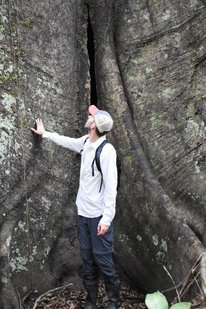
CFANS prepares students to tackle the world’s grand challenges
The Environmental Sciences, Policy and Management major equips students to become skilled advocates, scientists, and leaders
Nico Bacigalupo Zappia has been enchanted with the outdoors since he was a little kid. His mom was a permaculture teacher and gardener and instilled in him a deep appreciation for nature. In fact, some of his earliest memories are gardening with his mom.
With his passion for the environment, it’s not a surprise that Zappia would choose Environmental Sciences, Policy, and Management (ESPM) as his major at the University of Minnesota’s College of Food, Agricultural, and Natural Resource Sciences (CFANS).
ESPM is an interdisciplinary science major within CFANS that equips students to become skilled advocates, scientists, and leaders. An integrated core set of classes stresses the linkages between science, management, policy education, and business. Students majoring in ESPM go into their careers prepared to make a difference.
“Our students are here because they want to change the world,” said Joe Knight, PhD, ESPM program director and professor in the Department of Forest Resources. “There are some significant challenges on the horizon and somebody has to step in and make it better.”
Knight points out that many other schools have environmental science and environmental policy programs, but what makes ESPM stand out is that all of it is rolled into one program. Within the major, students have four career tracks to choose from: Conservation and Resource Management; Environmental Education and Communication; Environmental Science; and Policy, Planning, Law, and Society.
Not your typical classroom
When it comes to the ESPM classroom experience, it’s all about active learning. Instead of hearing about a topic in a lecture hall, students get to go out and physically experience it.

According to Zappia, “It demands that you go interact with the environment around you.”
He also points out the practicality of everything he’s learned. He says that the curriculum has real-life applications, especially in a place like the Twin Cities.
“You’re learning about environmental science and policy and the Mississippi River runs through our campus,” said Zappia. “Everything that you’re learning about is right outside your door. That’s what I’ve adored so much is that you instantly see an application for everything you’re learning.”
Students’ experiences are also enriched by dedicated faculty. Because of the smaller class sizes, students have the ability to interact with their professors and build meaningful relationships.
“Within CFANS, there’s a lot of emphasis on faculty connecting with students,” said Knight. “We’re here to be good educators and mentors.”
In addition to building meaningful relationships, Zappia says that professors walk into their classes with a foundational trust that their students are capable. Professors become their students’ biggest cheerleaders.
“They see the potential in each of us. If there’s anything you want to explore, there’s no hesitation to help you dig into that,” he said.
A purpose worth investing in
Kowsar Mohamed, a graduate of the program, had a similar experience. She believes the most compelling aspect of the program is the fact that instructors care as much as they do. She had robust mentorships and advisors championing her along the way.
“As long as you’re able to put forward your needs, they are going to make the time for you,” recalls Mohamed. “Teachers were intentional about being a teacher first. They ensure that you get the hands-on experience that you need so that you have a working portfolio when you graduate.”
Today, Mohamed works for the Center for Economic Inclusion as the director of strategic partnerships. In her current role, she works with public and private companies in the Twin Cities to increase racial equity, economic competitiveness, and inclusion to ensure all agencies and institutions are working to support people who have been marginalized. It’s a job Mohamed says she was fully prepared for because of the dedicated faculty, community support, and authentic classroom experiences within the ESPM program.
Mohamed credits the ESPM program with providing an opportunity to investigate the challenges that people, places, spaces, and policies are all facing and creating a launchpad for her to get into the space of equitable environmental justice, understanding environmental sustainability, race equity, and inclusion.
“What ESPM did for me is monumental because it gave me a purpose worth investing in,” she said, noting that the degree also gave her tangible tools to apply in her day-to-day work.
The passion and energy that students like Zappia and Mohamed bring to the program is another major selling point, says Knight. When you walk into a classroom, there are interesting conversations happening with students from different backgrounds who are all excited to tackle important issues in their future careers.
“It’s really gratifying to see students so engaged and interested,” said Knight. “What could be more important than conserving and preserving the environment we live in? Our students are up for that challenge.”
If you’re interested in environmental issues, the ESPM major has many options. Learn about global environmental challenges and possible solutions. Your studies will open the door to forward-thinking career paths that make a real difference in the world.





